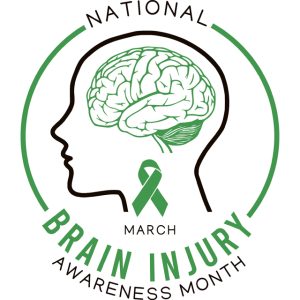
A traumatic brain injury is defined as the disruption of normal brain function caused by a blow or jolt to the head, which can be from a blast wave or a physical impact. While such injuries do occur during deployments, they are even more common in garrison, due to athletics, combative training, winter sports, falls, and motor vehicle crashes. Most people are familiar with the term “concussion,” which refers to a mild traumatic brain injury. Concussions can easily go unrecognized, because sometimes they occur without loss of consciousness or other visible signs.
March is Brain Injury Awareness Month. All service members and their families benefit from the awareness that concussions can be serious and are worth evaluation. The Defense Health Agency’s Traumatic Brain Injury Center of Excellence reports more than 460,000 TBI diagnoses in the military health system since 2000. This March, The Traumatic Brain Injury Center of Excellence is promoting awareness of brain injuries with information and resources about how to protect, treat, and optimize your brain.
Protect
It is important to prevent brain injury whenever possible. To avoid motor vehicle accidents, a common cause of concussion, drivers should obey all traffic signals and practice defensive driving. Both children and adults should wear helmets whenever one is made for the sport or activity. This includes cycling, skateboarding, or rollerblading. Everyone should remain aware of drivers and other people to avoid collisions during these activities.
In the summer, observe safe swimming practices; running near pools and shallow diving should not be allowed. During winter, it is important to clear away snow and ice at home, maintaining awareness of potentially slippery surfaces when in public. Falls on icy paths cause concussions each year. Those who enjoy skiing and snowboarding in the winter should exercise caution and wear a properly fitting helmet.
Treat
Stop and seek medical help if you think you or someone else may have experienced a concussion.
Health care providers can evaluate possible concussions and guide the recovery process. Landstuhl Regional Medical Center’s TBI Clinic provides specialized evaluation and care, including management of ongoing conditions after concussion. Symptoms such as headache, dizziness, balance difficulties, vision problems, depression, anxiety, and more can persist after head injury, and targeted therapy may be required for recovery.
The LRMC TBI Clinic can be reached at DSN 314-590-5601 or +49 6371 9464 5601; no referral is needed. Full recovery and return to duty is the goal!
You can stay up to date on the latest research, publications, and guidance for brain health, injury, and recovery via the resources on www.health.mil/TBI. Caregivers, there is plenty for you there as well. Additionally, your health care providers are excellent sources of information and answers to specific questions regarding TBI and related symptoms. They can help guide a gradual return to normal activity after a concussion to ensure safe and complete recovery.
Optimize
Restful sleep is key to wellness, including that of the brain. Exercise improves focus and memory. You can eat for brain health, too! Dark-colored berries and fruits, dark chocolate, green tea and walnuts are a few foods which supply antioxidants to combat harmful free radicals. Foods rich in omega-3 fatty acid, a critical nutrient for brain tissue, include avocados, nuts, and fish — especially salmon. Whole grains provide long-lasting fuel for brain function.
Finally, mental exercise — reading, learning, logic puzzles, strategy games, social activities and new concepts build strong connections in the brain. Universal recommendations to avoid nicotine, drugs, and alcohol are true for brain wellness as well.
Be a brain warrior! Your brain is yours for life. Take care of it.


